Search : Suspense
Search : Suspense
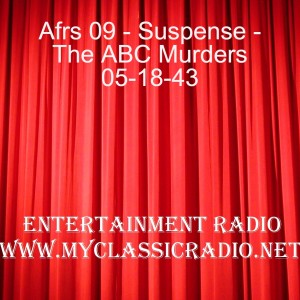


Friday Mar 04, 2022
Afrs 09 - Suspense - The ABC Murders 05-18-43
Friday Mar 04, 2022
Friday Mar 04, 2022
The biggest names in Hollywood and Broadway recorded for AFRS during the war years, The American Forces Network can trace its origins back to May 26, 1942, when the War Department established the Armed Forces Radio Service (AFRS). The U.S. Army began broadcasting from London during World War II, using equipment and studio facilities borrowed from the British Broadcasting Corporation (BBC). The first transmission to U.S. troops began at 5:45 p.m. on July 4, 1943, and included less than five hours of recorded shows, a BBC news and sports broadcast. That day, Corporal Syl Binkin became the first U.S. Military broadcasters heard over the air. The signal was sent from London via telephone lines to five regional transmitters to reach U.S. troops in the United Kingdom as they prepared for the inevitable invasion of Nazi-occupied Europe. Fearing competition for civilian audiences the BBC initially tried to impose restrictions on AFN broadcasts within Britain (transmissions were only allowed from American Bases outside London and were limited to 50 watts of transmission power) and a minimum quota of British produced programming had to be carried. Nevertheless AFN programmes were widely enjoyed by the British civilian listeners who could receive them and once AFN operations transferred to continental Europe (shortly after D-Day) AFN were able to broadcast with little restriction with programmes available to civilian audiences across most of Europe (including Britain) after dark. As D-Day approached, the network joined with the BBC and the Canadian Broadcasting Corporation to develop programs especially for the Allied Expeditionary Forces. Mobile stations, complete with personnel, broadcasting equipment, and a record library were deployed to broadcast music and news to troops in the field. The mobile stations reported on front line activities and fed the news reports back to studio locations in London.
---------------------------------------------------------------------------
Entertainment Radio Stations Live 24/7 Sherlock Holmes/CBS Radio Mystery Theater
https://live365.com/station/Sherlock-Holmes-Classic-Radio--a91441
https://live365.com/station/CBS-Radio-Mystery-Theater-a57491
----------------------------------------------------------------------------
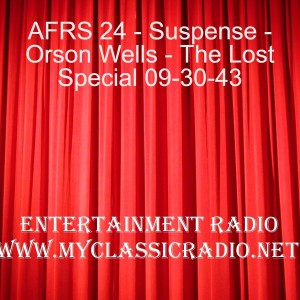


Saturday Feb 26, 2022
AFRS 24 - Suspense - Orson Wells - The Lost Special 09-30-43
Saturday Feb 26, 2022
Saturday Feb 26, 2022
The series began on NBC Radio as a summer replacement situation comedy in 1944, featuring vocalist Bea Wain. It then moved to ABC Radio with Jean Gillespie portraying Young's girlfriend Betty. The program was next broadcast by NBC for a 1946–47 run and was off in 1948. When it returned to NBC in 1949, Louise Erickson played Betty and Jim Backus was heard as wealthy and snobbish playboy Hubert Updike III, a character he later adapted as Thurston Howell III in Gilligan's Island.
---------------------------------------------------------------------------
Entertainment Radio Stations Live 24/7 Sherlock Holmes/CBS Radio Mystery Theater
https://live365.com/station/Sherlock-Holmes-Classic-Radio--a91441
https://live365.com/station/CBS-Radio-Mystery-Theater-a57491
----------------------------------------------------------------------------
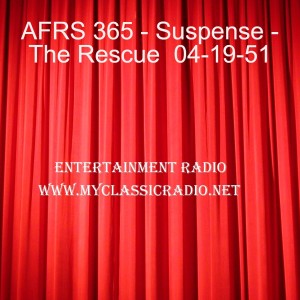


Sunday Jan 16, 2022
AFRS 365 - Suspense - The Rescue 04-19-51
Sunday Jan 16, 2022
Sunday Jan 16, 2022
The biggest names in Hollywood and Broadway recorded for AFRS during the war years, The American Forces Network can trace its origins back to May 26, 1942, when the War Department established the Armed Forces Radio Service (AFRS). The U.S. Army began broadcasting from London during World War II, using equipment and studio facilities borrowed from the British Broadcasting Corporation (BBC). The first transmission to U.S. troops began at 5:45 p.m. on July 4, 1943, and included less than five hours of recorded shows, a BBC news and sports broadcast. That day, Corporal Syl Binkin became the first U.S. Military broadcasters heard over the air. The signal was sent from London via telephone lines to five regional transmitters to reach U.S. troops in the United Kingdom as they prepared for the inevitable invasion of Nazi-occupied Europe. Fearing competition for civilian audiences the BBC initially tried to impose restrictions on AFN broadcasts within Britain (transmissions were only allowed from American Bases outside London and were limited to 50 watts of transmission power) and a minimum quota of British produced programming had to be carried. Nevertheless AFN programmes were widely enjoyed by the British civilian listeners who could receive them and once AFN operations transferred to continental Europe (shortly after D-Day) AFN were able to broadcast with little restriction with programmes available to civilian audiences across most of Europe (including Britain) after dark. As D-Day approached, the network joined with the BBC and the Canadian Broadcasting Corporation to develop programs especially for the Allied Expeditionary Forces. Mobile stations, complete with personnel, broadcasting equipment, and a record library were deployed to broadcast music and news to troops in the field. The mobile stations reported on front line activities and fed the news reports back to studio locations in London.
---------------------------------------------------------------------------
Entertainment Radio Stations Live 24/7 Sherlock Holmes/CBS Radio Mystery Theater
https://live365.com/station/Sherlock-Holmes-Classic-Radio--a91441
https://live365.com/station/CBS-Radio-Mystery-Theater-a57491
----------------------------------------------------------------------------
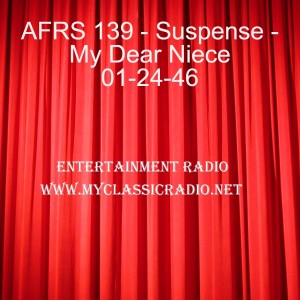


Sunday Jan 16, 2022
AFRS 139 - Suspense - My Dear Niece 01-24-46
Sunday Jan 16, 2022
Sunday Jan 16, 2022
The biggest names in Hollywood and Broadway recorded for AFRS during the war years, The American Forces Network can trace its origins back to May 26, 1942, when the War Department established the Armed Forces Radio Service (AFRS). The U.S. Army began broadcasting from London during World War II, using equipment and studio facilities borrowed from the British Broadcasting Corporation (BBC). The first transmission to U.S. troops began at 5:45 p.m. on July 4, 1943, and included less than five hours of recorded shows, a BBC news and sports broadcast. That day, Corporal Syl Binkin became the first U.S. Military broadcasters heard over the air. The signal was sent from London via telephone lines to five regional transmitters to reach U.S. troops in the United Kingdom as they prepared for the inevitable invasion of Nazi-occupied Europe. Fearing competition for civilian audiences the BBC initially tried to impose restrictions on AFN broadcasts within Britain (transmissions were only allowed from American Bases outside London and were limited to 50 watts of transmission power) and a minimum quota of British produced programming had to be carried. Nevertheless AFN programmes were widely enjoyed by the British civilian listeners who could receive them and once AFN operations transferred to continental Europe (shortly after D-Day) AFN were able to broadcast with little restriction with programmes available to civilian audiences across most of Europe (including Britain) after dark. As D-Day approached, the network joined with the BBC and the Canadian Broadcasting Corporation to develop programs especially for the Allied Expeditionary Forces. Mobile stations, complete with personnel, broadcasting equipment, and a record library were deployed to broadcast music and news to troops in the field. The mobile stations reported on front line activities and fed the news reports back to studio locations in London.
---------------------------------------------------------------------------
Entertainment Radio Stations Live 24/7 Sherlock Holmes/CBS Radio Mystery Theater
https://live365.com/station/Sherlock-Holmes-Classic-Radio--a91441
https://live365.com/station/CBS-Radio-Mystery-Theater-a57491
----------------------------------------------------------------------------
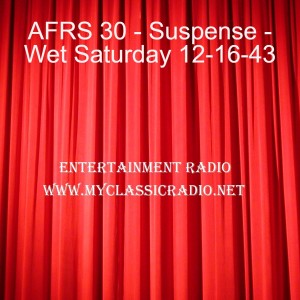


Saturday Jan 15, 2022
AFRS 30 - Suspense - Wet Saturday 12-16-43
Saturday Jan 15, 2022
Saturday Jan 15, 2022
The biggest names in Hollywood and Broadway recorded for AFRS during the war years, The American Forces Network can trace its origins back to May 26, 1942, when the War Department established the Armed Forces Radio Service (AFRS). The U.S. Army began broadcasting from London during World War II, using equipment and studio facilities borrowed from the British Broadcasting Corporation (BBC). The first transmission to U.S. troops began at 5:45 p.m. on July 4, 1943, and included less than five hours of recorded shows, a BBC news and sports broadcast. That day, Corporal Syl Binkin became the first U.S. Military broadcasters heard over the air. The signal was sent from London via telephone lines to five regional transmitters to reach U.S. troops in the United Kingdom as they prepared for the inevitable invasion of Nazi-occupied Europe. Fearing competition for civilian audiences the BBC initially tried to impose restrictions on AFN broadcasts within Britain (transmissions were only allowed from American Bases outside London and were limited to 50 watts of transmission power) and a minimum quota of British produced programming had to be carried. Nevertheless AFN programmes were widely enjoyed by the British civilian listeners who could receive them and once AFN operations transferred to continental Europe (shortly after D-Day) AFN were able to broadcast with little restriction with programmes available to civilian audiences across most of Europe (including Britain) after dark. As D-Day approached, the network joined with the BBC and the Canadian Broadcasting Corporation to develop programs especially for the Allied Expeditionary Forces. Mobile stations, complete with personnel, broadcasting equipment, and a record library were deployed to broadcast music and news to troops in the field. The mobile stations reported on front line activities and fed the news reports back to studio locations in London.
---------------------------------------------------------------------------
Entertainment Radio Stations Live 24/7 Sherlock Holmes/CBS Radio Mystery Theater
https://live365.com/station/Sherlock-Holmes-Classic-Radio--a91441
https://live365.com/station/CBS-Radio-Mystery-Theater-a57491
----------------------------------------------------------------------------
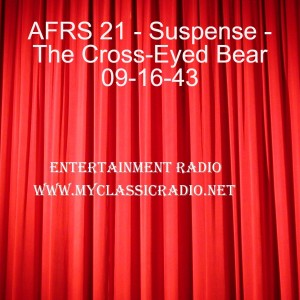


Friday Jan 14, 2022
AFRS 21 - Suspense - The Cross-Eyed Bear 09-16-43
Friday Jan 14, 2022
Friday Jan 14, 2022
The biggest names in Hollywood and Broadway recorded for AFRS during the war years, The American Forces Network can trace its origins back to May 26, 1942, when the War Department established the Armed Forces Radio Service (AFRS). The U.S. Army began broadcasting from London during World War II, using equipment and studio facilities borrowed from the British Broadcasting Corporation (BBC). The first transmission to U.S. troops began at 5:45 p.m. on July 4, 1943, and included less than five hours of recorded shows, a BBC news and sports broadcast. That day, Corporal Syl Binkin became the first U.S. Military broadcasters heard over the air. The signal was sent from London via telephone lines to five regional transmitters to reach U.S. troops in the United Kingdom as they prepared for the inevitable invasion of Nazi-occupied Europe. Fearing competition for civilian audiences the BBC initially tried to impose restrictions on AFN broadcasts within Britain (transmissions were only allowed from American Bases outside London and were limited to 50 watts of transmission power) and a minimum quota of British produced programming had to be carried. Nevertheless AFN programmes were widely enjoyed by the British civilian listeners who could receive them and once AFN operations transferred to continental Europe (shortly after D-Day) AFN were able to broadcast with little restriction with programmes available to civilian audiences across most of Europe (including Britain) after dark. As D-Day approached, the network joined with the BBC and the Canadian Broadcasting Corporation to develop programs especially for the Allied Expeditionary Forces. Mobile stations, complete with personnel, broadcasting equipment, and a record library were deployed to broadcast music and news to troops in the field. The mobile stations reported on front line activities and fed the news reports back to studio locations in London.
---------------------------------------------------------------------------
Entertainment Radio Stations Live 24/7 Sherlock Holmes/CBS Radio Mystery Theater
https://live365.com/station/Sherlock-Holmes-Classic-Radio--a91441
https://live365.com/station/CBS-Radio-Mystery-Theater-a57491
----------------------------------------------------------------------------
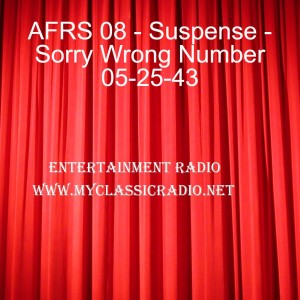


Friday Jan 14, 2022
AFRS 08 - Suspense - Sorry Wrong Number 05-25-43
Friday Jan 14, 2022
Friday Jan 14, 2022
The biggest names in Hollywood and Broadway recorded for AFRS during the war years, The American Forces Network can trace its origins back to May 26, 1942, when the War Department established the Armed Forces Radio Service (AFRS). The U.S. Army began broadcasting from London during World War II, using equipment and studio facilities borrowed from the British Broadcasting Corporation (BBC). The first transmission to U.S. troops began at 5:45 p.m. on July 4, 1943, and included less than five hours of recorded shows, a BBC news and sports broadcast. That day, Corporal Syl Binkin became the first U.S. Military broadcasters heard over the air. The signal was sent from London via telephone lines to five regional transmitters to reach U.S. troops in the United Kingdom as they prepared for the inevitable invasion of Nazi-occupied Europe. Fearing competition for civilian audiences the BBC initially tried to impose restrictions on AFN broadcasts within Britain (transmissions were only allowed from American Bases outside London and were limited to 50 watts of transmission power) and a minimum quota of British produced programming had to be carried. Nevertheless AFN programmes were widely enjoyed by the British civilian listeners who could receive them and once AFN operations transferred to continental Europe (shortly after D-Day) AFN were able to broadcast with little restriction with programmes available to civilian audiences across most of Europe (including Britain) after dark. As D-Day approached, the network joined with the BBC and the Canadian Broadcasting Corporation to develop programs especially for the Allied Expeditionary Forces. Mobile stations, complete with personnel, broadcasting equipment, and a record library were deployed to broadcast music and news to troops in the field. The mobile stations reported on front line activities and fed the news reports back to studio locations in London.
---------------------------------------------------------------------------
Entertainment Radio Stations Live 24/7 Sherlock Holmes/CBS Radio Mystery Theater
https://live365.com/station/Sherlock-Holmes-Classic-Radio--a91441
https://live365.com/station/CBS-Radio-Mystery-Theater-a57491
----------------------------------------------------------------------------
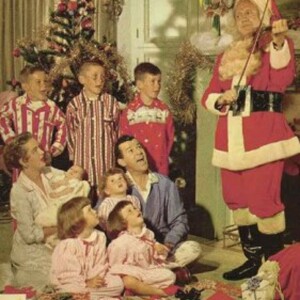


Sunday Oct 11, 2020
OTR Christmas Shows - Zero Hour, Ray Bradbury - 1960-01-03 CBS Suspense
Sunday Oct 11, 2020
Sunday Oct 11, 2020
---------------------------------------------------------------------------Sherlock Holmes Radio Station Live 24/7 Click Here to Listenhttps://live365.com/station/Sherlock-Holmes-Classic-Radio--a91441----------------------------------------------------------------------------Advertising Inquiries: https://redcircle.com/brandsPrivacy & Opt-Out: https://redcircle.com/privacy